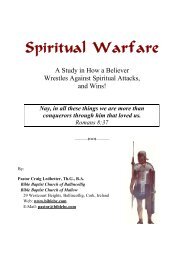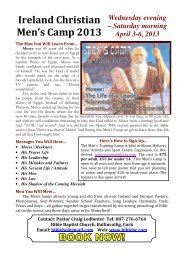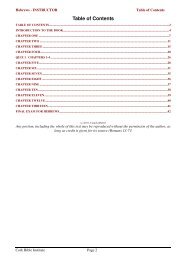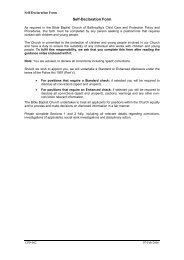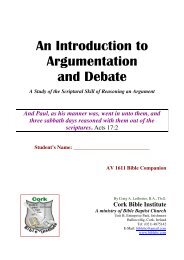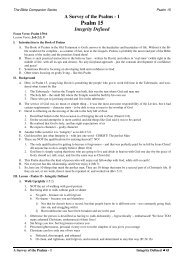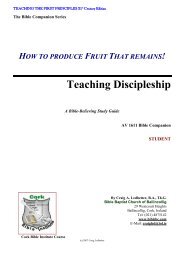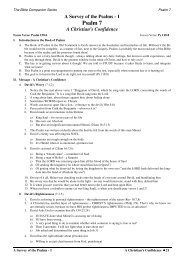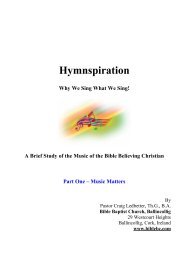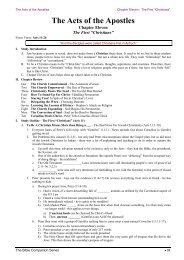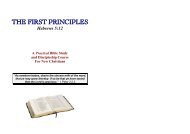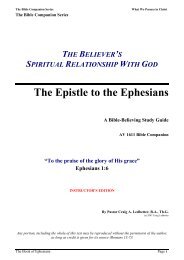Old Testament Survey - Student.pdf - Bible Baptist Church of Blarney
Old Testament Survey - Student.pdf - Bible Baptist Church of Blarney
Old Testament Survey - Student.pdf - Bible Baptist Church of Blarney
Create successful ePaper yourself
Turn your PDF publications into a flip-book with our unique Google optimized e-Paper software.
<strong>Old</strong> <strong>Testament</strong> <strong>Survey</strong> – <strong>Student</strong> Edition<br />
Exodus Through Deuteronomy<br />
Leviticus<br />
Leviticus - The Holiness <strong>of</strong> God<br />
Summary and Key Scriptures<br />
Leviticus was written to show Israel how to live as a holy nation in fellowship with God,<br />
and thus to prepare the nation for the high service <strong>of</strong> mediating the redemption <strong>of</strong> God to all<br />
the nations. Above all, then, Israel must be taught the holiness <strong>of</strong> God, and Leviticus reveals<br />
this in three ways: (1) in the sacrificial system, which insisted that “without the shedding <strong>of</strong><br />
blood there is no remission,” (Lev 17:11; Heb 9:22) thus pressing on the hardest conscience<br />
the seriousness <strong>of</strong> sin: (2) in the precepts <strong>of</strong> the law, which showed one Divinely revealed<br />
standard for all character and conduct; (3) and in the penalties attaching to violations <strong>of</strong> the<br />
law, which sternly proclaimed the inflexibility <strong>of</strong> the Divine holiness – not subject to debate.<br />
Perhaps as the first simple step toward understanding the message <strong>of</strong> Leviticus is to<br />
appreciate the first words <strong>of</strong> the first chapter - “And the Lord called unto Moses, and spake<br />
unto him OUT OF THE TABERNACLE OF THE CONGREGATION.” Before this, a distant<br />
God has spoken from “the mount that burned with fire”; but now ... God who dwells among<br />
His people in fellowship with them speaks “out <strong>of</strong> the Tabernacle.” The people, therefore, are<br />
not addressed as sinners distanced from God, like those <strong>of</strong> other nations, but as being already<br />
brought into a new relationship, even that <strong>of</strong> fellowship, on the ground <strong>of</strong> a blood-sealed<br />
covenant paid for by the blood <strong>of</strong> the Passover Lamb. This is the point at which Leviticus<br />
begins. In Genesis we see God’s remedy for man’s ruin - the Seed <strong>of</strong> the woman. In Exodus<br />
we see God’s answer to man’s cry - the blood <strong>of</strong> the Lamb. In Leviticus we see God’s<br />
provision for man’s need - a Priest, a Sacrifice, and an Altar. (It is from this that Leviticus<br />
gets its name. Israel’s priests were the Levites, and the word “Letivicus” comes from the<br />
Greek Levitikos, meaning, “that which pertains to the Levites.”) With good reason Leviticus<br />
holds the central place among the five books <strong>of</strong> Moses, for, with its doctrine <strong>of</strong> mediation<br />
through a priest, forgiveness through a sacrifice, and reconciliation at the altar, it is the very<br />
heart <strong>of</strong> the Pentateuch - and <strong>of</strong> the Gospel.<br />
I. Five Laws Regarding Sacrifices (1 - 7)<br />
A. Whole burnt <strong>of</strong>fering (1:3-17)<br />
B. Grain <strong>of</strong>fering (2:1-16)<br />
C. Peace <strong>of</strong>fering (3:1-17)<br />
D. Sin <strong>of</strong>fering (4:1-35)<br />
E. Guilt <strong>of</strong>fering (5:1-6:7)<br />
F. Priestly responsibilities (6:8-7:36)<br />
Outline <strong>of</strong> Events in Leviticus<br />
II. Ordination <strong>of</strong> Aaron and His Sons (8:1-9:24)<br />
III. Problems and Warnings for Priests (10:1-20) – Nadab and<br />
Abihu die for abuse <strong>of</strong> their <strong>of</strong>fice<br />
IV. The Day <strong>of</strong> Atonement (16:1-34)<br />
V. The Holy Life (17:1-26:46)<br />
A. Eating meat (17:1-16) and prohibition about blood<br />
B. Sexual conduct (18:1-30)<br />
C. Behaviour toward others (19:1-37)<br />
VI. Crimes deserving capital punishment (20:1-27)<br />
CBI - Practical Doctrine Page 28



